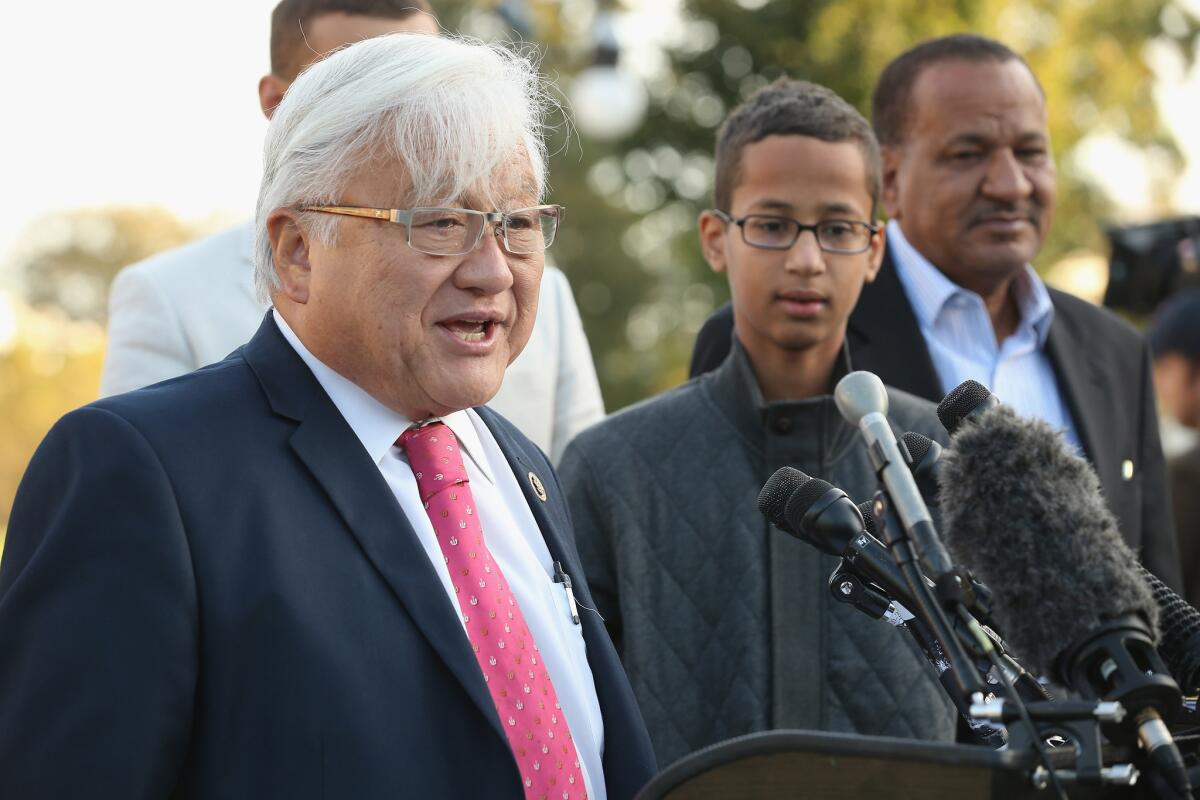Mike Honda stands with ‘clock kid’ and decries racial profiling

Rep. Mike Honda (D-San Jose) with 14-year-old Ahmed Mohamed at a news conference in Washington.
Rep. Mike Honda said outside the Capitol on Tuesday morning that he is proud Silicon Valley has reached out to the 14-year-old Texas student arrested after bringing a homemade clock to school.
Ahmed Mohamed joined Honda after visiting the White House on Monday for astronomy night, talking briefly with President Obama about Mars.
In the weeks since the student’s arrest, he has been invited to visit or intern at some of the country’s largest tech companies, including several in Honda’s district.
“In Silicon Valley, we know we are made stronger by the diversity of our workforce and we believe in the promise of religious freedom,” said Honda (D-San Jose).
Honda and 26 House members authored a letter to U.S. Atty. Gen. Loretta Lynch on Sept. 23 asking the Justice Department to review the circumstances of Ahmed’s arrest and detention. Eight California Democrats were among those who signed the letter.
In mid-September, Ahmed brought a homemade clock to his Irving, Texas, high school to show his engineering teacher. An English teacher heard the project beeping and called police.
Muslim and civil rights groups have called the incident racial profiling and say the boy wasn’t allowed to have his parents present during questioning, contrary to Texas law. Local police have said Ahmed’s religion and ethnicity — he is Muslim and his father emigrated from Sudan — did not play a role in his arrest. No charges were filed. Ahmed no longer attends the school.
Ahmed said he is glad he was arrested. The incident should be a reminder, he said, that “you always judge a person on their heart, not what they look like.”
SIGN UP for our free Essential Politics newsletter >>
Honda said there shouldn’t be room for how Ahmed was treated.
“We have to ask the difficult questions. Would the same scenario have played out if a child with another name had brought this clock to school instead of an Ahmed Mohamed?” he said.
Honda spent his early childhood in a Japanese internment camp during World War II. He said America should have learned by now about not punishing people based on race or ethnicity.
“It was wrong then, and it’s wrong now,” Honda said.
Follow @sarahdwire on Twitter
ALSO:
What it’s like to run for office — from 2,296 miles away
For more, go to www.latimes.com/politics.
More to Read
Get the L.A. Times Politics newsletter
Deeply reported insights into legislation, politics and policy from Sacramento, Washington and beyond. In your inbox three times per week.
You may occasionally receive promotional content from the Los Angeles Times.










